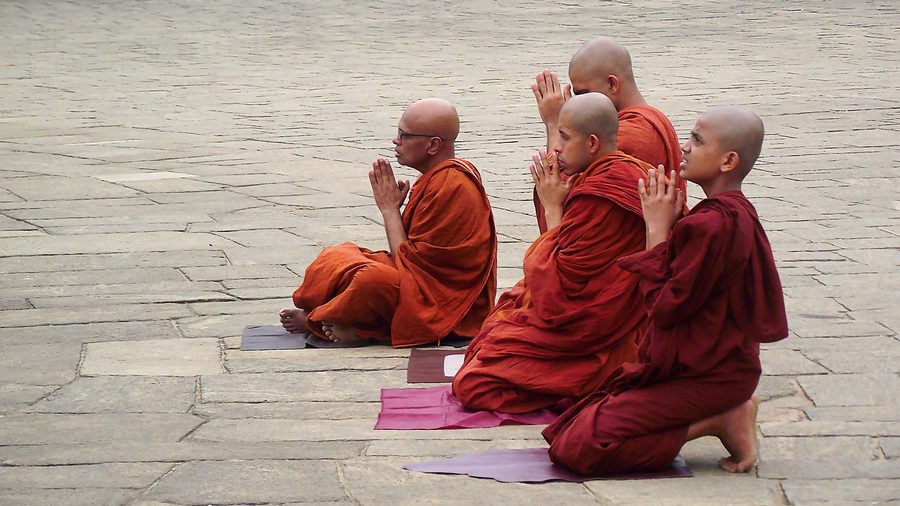Near Sāvatthī. “There are these four nutriments for the maintenance of beings who have come into being or for the support of those in search of a place to be born. Which four? Physical food, gross or refined; contact as the second, intellectual intention the third, and consciousness the fourth. These are the four nutriments for the maintenance of beings who have come into being or for the support of those in search of a place to be born.
“And how is physical food to be regarded? Suppose a couple, husband & wife, taking meager provisions, were to travel through a desert. With them would be their only baby son, dear & appealing. Then the meager provisions of the couple going through the desert would be used up & depleted while there was still a stretch of the desert yet to be crossed. The thought would occur to them, ‘Our meager provisions are used up & depleted while there is still a stretch of this desert yet to be crossed. What if we were to kill this only baby son of ours, dear & appealing, and make dried meat & jerky. That way—chewing on the flesh of our son—at least the two of us would make it through this desert. Otherwise, all three of us would perish.’ So they would kill their only baby son, loved & endearing, and make dried meat & jerky. Chewing on the flesh of their son, they would make it through the desert. While eating the flesh of their only son, they would beat their breasts, (crying,) ‘Where have you gone, our only baby son? Where have you gone, our only baby son?’ Now what do you think, monks? Would that couple eat that food playfully or for intoxication, or for putting on bulk, or for beautification?”
“No, lord.”
“Wouldn’t they eat that food simply for the sake of making it through that desert?”
“Yes, lord.”
“In the same way, I tell you, is the nutriment of physical food to be regarded. When physical food is comprehended, passion for the five strings of sensuality is comprehended. When passion for the five strings of sensuality is comprehended, there is no fetter bound by which a disciple of the noble ones would come back again to this world.
“And how is the nutriment of contact to be regarded? Suppose a flayed cow were to stand leaning against a wall. The creatures living in the wall would chew on it. If it were to stand leaning against a tree, the creatures living in the tree would chew on it. If it were to stand exposed to water, the creatures living in the water would chew on it. If it were to stand exposed to the air, the creatures living in the air would chew on it. For wherever the flayed cow were to stand exposed, the creatures living there would chew on it. In the same way, I tell you, is the nutriment of contact to be regarded. When the nutriment of contact is comprehended, the three feelings [pleasure, pain, neither pleasure nor pain] are comprehended. When the three feelings are comprehended, I tell you, there is nothing further for a disciple of the noble ones to do.
“And how is the nutriment of intellectual intention to be regarded? Suppose there were a pit of glowing embers, deeper than a man’s height, full of embers that were neither flaming nor smoking, and a man were to come along—loving life, hating death, loving pleasure, abhorring pain—and two strong men, having grabbed him by the arms, were to drag him to the pit of embers. To get far away would be that man’s intention, far away would be his wish, far away would be his aspiration. Why is that? Because he would realize, ‘If I fall into this pit of glowing embers, I will meet with death from that cause, or with death-like pain.’ In the same way, I tell you, is the nutriment of intellectual intention to be regarded. When the nutriment of intellectual intention is comprehended, the three forms of craving [for sensuality, for becoming, and for non-becoming] are comprehended. When the three forms of craving are comprehended, I tell you, there is nothing further for a disciple of the noble ones to do.
“And how is the nutriment of consciousness to be regarded? Suppose that, having arrested a thief, a criminal, they were to show him to the king: ‘This is a thief, a criminal for you, your majesty. Impose on him whatever punishment you like.’ So the king would say, ‘Go, men, and stab him in the morning with a hundred spears.’ So they would stab him in the morning with a hundred spears. Then the king would say at noon, ‘Men, how is that man?’ ‘Still alive, your majesty.’ So the king would say, ‘Go, men, and stab him at noon with a hundred spears.’ So they would stab him at noon with a hundred spears. Then the king would say in the evening, ‘Men, how is that man?’ ‘Still alive, your majesty.’ So the king would say, ‘Go, men, and stab him in the evening with a hundred spears.’ So they would stab him in the evening with a hundred spears. Now what do you think, monks? Would that man, being stabbed with three hundred spears a day, experience pain & distress from that cause?”
“Even if he were to be stabbed with only one spear, lord, he would experience pain & distress from that cause, to say nothing of three hundred spears.”
“In the same way, I tell you, monks, is the nutriment of consciousness to be regarded. When the nutriment of consciousness is comprehended, name-&-form is comprehended. When name-&-form is comprehended, I tell you, there is nothing further for a disciple of the noble ones to do.”
Read this translation of Saṁyutta Nikāya 12.63 Puttamaṁsa Sutta. A Son’s Flesh by Bhikkhu Ṭhanissaro on DhammaTalks.org. Or read a different translation on SuttaCentral.net, or AccessToInsight.org. Or listen on PaliAudio.com or SC-Voice.net. Or explore the Pali on DigitalPaliReader.online.
Or read a translation in Deutsch, Lietuvių Kalba, Bengali, Čeština, Español, Hebrew, Indonesian, Italiano, 日本語, မြန်မာဘာသာ, Norsk, Português, ру́сский язы́к, සිංහල, ไทย, Tiếng Việt, or 汉语. Learn how to find your language.





